WASHINGTON: Afghan government forces face an uncertain future and, in a worst-case scenario, some “bad possible outcomes” against Taliban insurgents as the withdrawal of American and coalition troops accelerates in the coming weeks, the top US military officer said Sunday.
General Mark Milley described the Afghan military and police as “reasonably well equipped, reasonably well trained, reasonably well led.” He cited Afghan troops’ years of experience against a resilient insurgency, but he declined to say they are fully ready to stand up to the Taliban without direct international backing during a potential Taliban offensive.
The chairman of the Joint Chiefs of Staff, a veteran of the war in Afghanistan, spoke in an interview with Associated Press and CNN reporters flying with him from Hawaii to Washington just hours after the formal kickoff of the withdrawal.
Asked whether he believes Afghan forces can hold up under increased strain, Milley was noncommittal.
“Your question: The Afghan army, do they stay together and remain a cohesive fighting force or do they fall apart? I think there’s a range of scenarios here, a range of outcomes, a range of possibilities,” he said. “On the one hand you get some really dramatic, bad possible outcomes. On the other hand, you get a military that stays together and a government that stays together.”
“Which one of these options obtains and becomes reality at the end of the day? We frankly don’t know yet. We have to wait and see how things develop over the summer.”
He said there is “at least still the possibility” of a negotiated political settlement between the government in Kabul and the Taliban. This, he said, would avoid the “massive civil war” that some fear could happen.
Within about two months of the US-led invasion in October 2001, the country’s Taliban rulers were removed from power and militarily defeated. But within several years, they had regrouped, rearmed and reasserted themselves, taking advantage of sanctuary in neighboring Pakistan. In recent years the Taliban achieved a battlefield stalemate with US-supported Afghan government forces.
Milley noted that the Afghan military has operated in recent years with less reliance on US and coalition advisers. Among the key exceptions are special operations commandos and the defense ministry.
“But for the most part, there’s no advisers out there anyway,” he said in one of his few interviews since President Joe Biden announced April 14 that all US military personnel will withdraw this summer. Milley said the commonly cited total of 2,500 troops rises to 3,300 if special operations forces are counted. “We’re taking it down to zero,” he said.
After the withdrawal is over, the United States will provide unspecified “capabilities” to the Afghan military from other locations, Milley said. He did not elaborate on this, but other officials have said those “over-the-horizon” arrangements for supporting the Afghan military have yet to be solidified.
Milley said it is possible that the withdrawal will be finished before the Sept. 11 target date announced by the White House. He said that date reflects the estimated maximum amount of time needed to move all US and coalition troops, as well as large amounts of equipment, out of the country.
“I don’t want to put precise dates on it,” he said.
US general: Afghan forces could face ‘bad possible outcomes’
https://arab.news/88aen
US general: Afghan forces could face ‘bad possible outcomes’
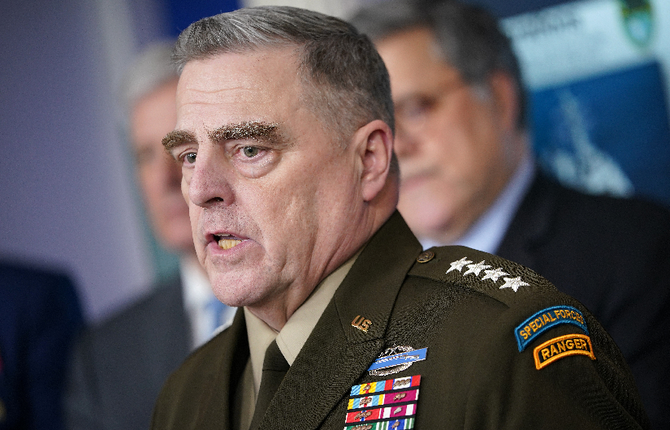
- Chairman of the Joint Chiefs of Staff says is possible troop withdrawal will be finished before Sept. 11 target date announced by White House
- Says Afghan military and police ‘reasonably’ well-equipped but that clarity on post-withdrawal possibilities would develop over the summer
Rohit says India-Pakistan Test cricket would be ‘awesome’
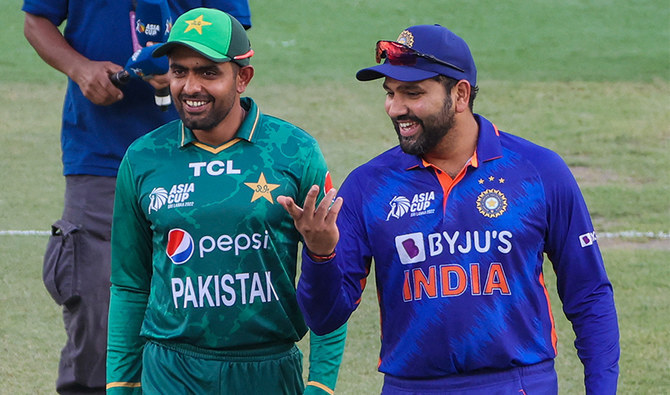
- South Asian neighbors are bitter political adversaries, have not faced off in Test since 2007
- They play only occasionally in shorter versions of game usually on neutral territory
NEW DELHI: India captain Rohit Sharma has thrown his support behind any resumption of Test cricket against arch-rivals Pakistan, saying it would be “awesome.”
The South Asian neighbors are bitter political adversaries and have fought three wars against each other since they were partitioned at the end of British colonial rule in 1947.
Their cricket teams have not faced off in a Test since 2007. Instead they play only occasionally in the shorter versions of the game and usually on neutral territory in international tournaments.
Rohit appeared Thursday on a YouTube chat show hosted by former captains Adam Gilchrist of Australia and Michael Vaughan of England.
Asked by Vaughan if playing Pakistan in a Test series would be beneficial for the five-day game, Rohit said: “I totally believe that.”
“They are a good team, superb bowling line-up, good contest. Especially if you play in overseas conditions, that will be awesome,” added the 36-year-old.
“I would love to. It would be a great contest between two sides... so why not?“
Australia has said it would be prepared to host a series between the rivals.
India and Pakistan have not faced each other on either side’s soil in a bilateral series since 2012.
India last year refused to travel to Pakistan for the white-ball Asia Cup, prompting part of the tournament to be staged in Sri Lanka.
They last met at the 50-over World Cup in India in October.
Pakistan aims to agree outline of new IMF loan in May — finance minister
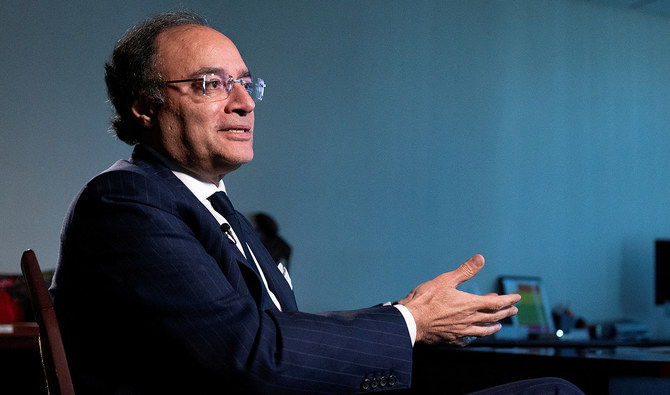
- Current $3 billion arrangement with IMF runs out in late April
- Pakistan is seeking longer and bigger loan of at least $6 billion
WASHINGTON: Pakistan hopes to agree the contours of a new International Monetary Fund loan in May, Finance Minister Muhammad Aurangzeb told Reuters, and has kicked off talks with ratings agencies to lay the groundwork for a return to international debt markets.
The country’s current $3 billion arrangement with the fund runs out in late April and the government is seeking a longer and bigger loan to help bring permanence to macroeconomic stability as well as an umbrella under which the country can execute much needed structural reforms, the minister said.
“We expect the IMF mission to be in Islamabad around the middle of May — and that is when some of these contours will start developing,” said Aurangzeb, who met with the Fund’s Managing Director Kristalina Georgieva on Wednesday during the International Monetary Fund and World Bank Spring Meetings.
He declined to outline what size program the government hoped to secure, though Pakistan is expected to seek at least $6 billion. Aurangzeb added that once the IMF loan was agreed, Pakistan would also request additional financing from the Fund under the Resilience and Sustainability Trust.
The struggling South Asian nation had managed to accumulate foreign exchange reserves in recent months and was on track for its war chest to hit $10 billion — or roughly two months import cover — by end-June.
The debt situation also looked more benign, Aurangzeb said.
“The bulk of our bilateral debt — including our China debt — is being rolled over, so in that sense I think we are in good shape and I don’t see a big issue during this fiscal year nor next fiscal year, cause we need to repay roughly $25 billion dollars every fiscal year.”
Pakistan also hopes to come back to international capital markets, possibly with a green bond. However, there was some more work to be done before that happens, said Aurangzeb.
“We have to come back into a certain ratings environment,” he said, having kicked off talks with ratings agencies, adding the government was hoping to get an improvement in its sovereign rating in the next fiscal year.
“In all likelihood, any international capital markets issuance will likely be in the 2025/2026 fiscal year.”
Five Japanese workers narrowly escape suicide bombing in Karachi
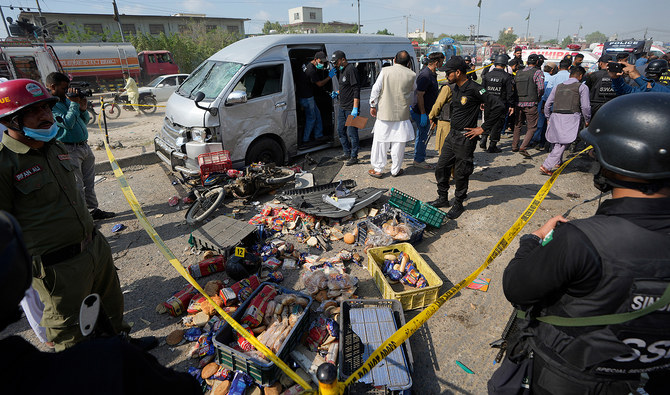
- Van attacked while heading to industrial area where five Japanese nationals worked at Pakistan Suzuki Motors
- Insurgents have recently targeted Chinese working on projects relating to China-Pakistan Economic Corridor
KARACHI: Five Japanese workers narrowly escaped on Friday after a suicide bomber detonated his explosive-laden vest near the van carrying them to their workplace, police said.
The Hiace van was on its way to an industrial area where the five Japanese nationals worked at Pakistan Suzuki Motors, according to local police chief Arshad Awan.
Police escorting the vehicle returned fire after coming under attack, killing an accomplice of the suicide bomber whose remains were found from the scene of the attack, he added. Three bystanders were wounded.
“All the Japanese who were the target of the attack are safe,” Awan told media.
Television footage on local news channels widely showed a damaged van, as police officers arrived at the scene of the attack. Awan said the three passersby who were wounded in the attack were in stable condition at a hospital.
Police were escorting the van after receiving reports about possible attacks on foreigners who are working in Pakistan on various Chinese-funded and other projects, said Tariq Mastoi, a senior police officer. He said a timely and quick response from the guards and police foiled the attack and both attackers were killed.
Prime Minister Shehbaz Sharif condemned the incident, according to a statement posted on X.
“Timely action by the police saved us from any major loss of life,” he said. “We will not rest until terrorism has been completely eradicated. We will thwart every nefarious act of disturbing the law and order situation.”
Murad Ali Shah, the chief minister of Sindh, of which Karachi is the provincial capital, directed the inspector general to submit a report after investigating the attack, including details on who the attackers were, where they came from, any information on their facilitators and details of explosives used in the blast.
He directed that immediate arrangements be made for the security of all foreigners in the province.
“Anti-national elements want to disrupt law and order, which will not be allowed at any cost,” the CM said, praising what he called timely action of the police in thwarting the attack.
No one immediately claimed responsibility, but suspicion is likely to fall on a small separatist group or the Pakistani Taliban who have stepped up attacks on security forces.
In recent weeks, insurgents have also targeted Chinese who are working in Pakistan on projects relating to the China-Pakistan Economic Corridor, which includes a multitude of megaprojects such as road construction, power plants and agriculture.
In March, five Chinese nationals and their Pakistani driver were killed when a suicide bomber in northwest Pakistan rammed his explosive-laden car into a vehicle when they were heading to the Dasu Dam, the biggest hydropower project in Pakistan, where they worked.
However, Japanese working in Pakistan have not been the target of any such attacks.
With inputs from AP
Saudi deputy defense minister discusses security cooperation proposals with Pakistan army chief
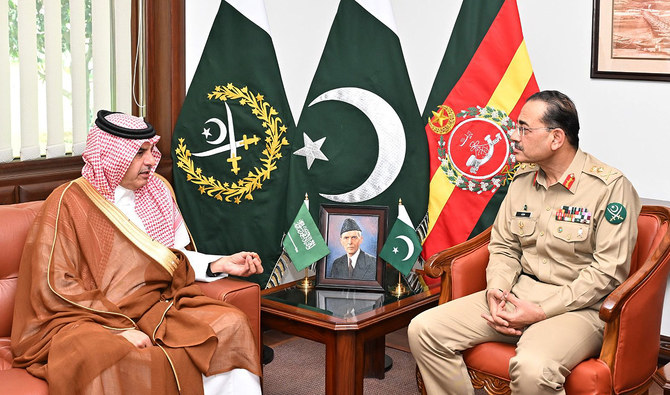
- Al-Otaibi arrived in Pakistan earlier this week to finalize defense-related bilateral projects
- Saudi official participates in the Fifth Meeting of Pakistan-KSA Defense Collaboration
ISLAMABAD: Saudi Assistant Defense Minister Talal Bin Abdullah Bin Turki Al-Otaibi called on Pakistani Chief of Army Staff Gen Syed Asim Munir on Friday and discussed defense collaboration projects, the Pakistani military said on Friday.
Al-Otaibi arrived in Pakistan earlier this week to finalize defense-related bilateral projects, according to the Pakistani defense ministry. His visit follows on the heels of a two-day visit to Islamabad by Saudi Foreign Minister Faisal bin Farhan Al Saud, aimed at enhancing bilateral economic cooperation and pushing forward previously agreed investment deals. Pakistan has said it pitched investment projects worth$30 billion to Riyadh during Prince Faisal’s visit.
“During the meeting, matters of mutual interest and measures to further enhance bilateral defense collaboration including defense production and military training were discussed,” the Pakistan army statement said.
“COAS affirmed Pakistan Army’s continuing support toward capacity building of Royal Saudi Land Forces.
“Both sides reiterated their resolve to solidify the efforts in defense collaboration with focused approach to target specific capabilities in land, air and sea domains. In this context, concrete proposals were deliberated by the forum to meet tangible objectives within specific timelines.”
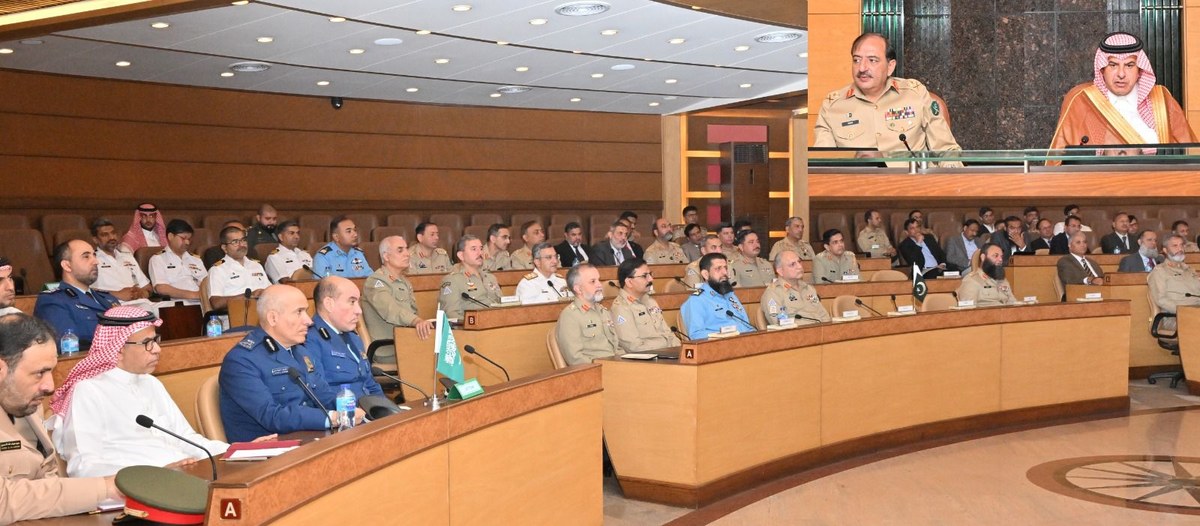
Al-Otaibi also participated in the Fifth Meeting of Pakistan-KSA Defense Collaboration at the Pakistan army’s headquarters in Rawalpindi.
The forum discussed challenges to global and regional security and noted that rapid advancements in modern technologies “necessitated defense industrial cooperation in critical capabilities between the two brotherly countries.”
“The visiting dignitary acknowledged Pakistan Army’s achievements and sacrifices in war against terrorism and Army’s valuable contributions toward regional peace and stability,” the army’s statement said.
Pakistan maintains close military ties with Saudi Arabia, providing extensive support, arms, and training to the Saudi armed forces.
Since the 1970s, Pakistani soldiers have been stationed in Saudi Arabia to protect the Kingdom and Pakistan has also been providing training to Saudi soldiers and pilots. The two nations also regularly carry out multidimensional joint ventures and defense exercises.
Five Japanese workers narrowly escape suicide bombing that targeted their vehicle in Pakistan
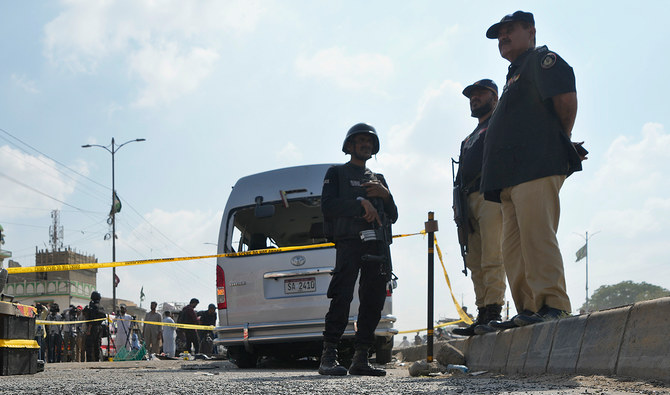
- Van had been heading to an industrial area where the five Japanese nationals worked at Pakistan Suzuki Motors
- Insurgents have also targeted Chinese working on Pakistan on projects relating to the China-Pakistan Economic Corridor
KARACHI: A suicide bomber detonated his explosive-laden vest near a van carrying Japanese autoworkers, who narrowly escaped the attack Friday that wounded three bystanders in Pakistan’s port city of Karachi, police said.
The van had been heading to an industrial area where the five Japanese nationals worked at Pakistan Suzuki Motors, local police chief Arshad Awan said. He said police escorting the Japanese returned fire after coming under attack, killing an accomplice of the suicide bomber whose remains were found from the scene of the attack.
“All the Japanese who were the target of the attack are safe,” he said.
Images on local news channels showed a damaged van, as police officers arrived at the scene of the attack. Awan said the three passersby who were wounded in the attack were in stable condition at a hospital.
Police were escorting the van after receiving reports about possible attacks on foreigners who are working in Pakistan on various Chinese-funded and other projects, said Tariq Mastoi, a senior police officer. He said a timely and quick response from the guards and police foiled the attack and both attackers were killed.
No one immediately claimed responsibility, but suspicion is likely to fall on a small separatist group or Pakistani Taliban who have stepped up attacks on security forces in recent years. Insurgents have also targeted Chinese who are working on Pakistan on projects relating to the China-Pakistan Economic Corridor, which includes a multitude of megaprojects such as road construction, power plants and agriculture.
In March, five Chinese and their Pakistani driver were killed when a suicide bomber in northwest Pakistan rammed his explosive-laden car into a vehicle when they were heading to the Dasu Dam, the biggest hydropower project in Pakistan, where they worked.
However, Japanese working in Pakistan have not been target of any such attacks.
Karachi is the largest city of Pakistan and the capital of southern Sindh province.










